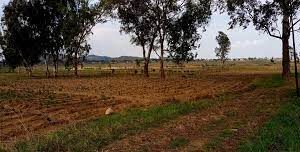
As climate change wreaks havoc across the 36 states and the Federal Capital Territory (FCT), environmentalists have sounded the alarm over the continued dwindling of forests due to illegal logging.
The Publisher and Editor-in-Chief of Development Agenda magazine, Mr. Paddy Ezeala, made this disclosure during a one-day seminar organized by Development Agenda in collaboration with the Environmental Media Correspondents Association of Nigeria in Abuja recently on the theme: “Climate change and COP28: The way forward for Nigeria.
It estimated that 1.5 million trees are cut down daily due to illegal logging, leading to deforestation of 3.5 percent per year.
Mr. Ezeala said the mention of a foreign private charcoal production factory in Nsukka, Enugu State, compounded the destruction caused by foreigners, adding that neighboring states were affected by the massive logging.
He lamented that people were cutting down trees recklessly in Cross Rivers, Ondo, Ogun, as well as some North Central states. Nigeria experiences forest loss of 4 percent per year, which is considered the highest in the world.
Ezeala suggested that between 1981 and 2000, Nigeria lost 3.7 million hectares of forests, implying a colossal loss of biodiversity.
Forest cover has reduced to less than 10 percent, contrary to the mandate of the Food and Agriculture Organization (FAO) that each state must maintain its forest cover at a minimum of 25 percent of its area.
While around 484 plant species are threatened with extinction, the publisher deplores the absence of measures to encourage forest regeneration.
“Added to this is the absence of a valuation system to assign a value to forest resources, so that when forests are destroyed by the negligence of individuals or companies, adequate compensation is paid “, did he declare.
He said there was a need to develop more environmentally and socially equitable approaches to forest management in Nigeria, noting that the wanton destruction of forests across the country must be stopped.
Ezeala added: “Forests perform a wide range of critical environmental and climate functions, including maintaining a constant supply of water. Forests are home to species and at the same time have very deep economic, aesthetic, industrial and religious significance for humans.
“However, economic development pressures often lead to the conversion of forest ecosystems without considering both the long-term economic costs and the implications of immediate loss of biodiversity, ecosystem structure and function. »
He spoke of the need to harness the potential of forests for the development of ecotourism and scientific research rather than continuing illegal logging and wildlife trafficking.
The publisher claimed that Nigeria’s remaining rainforests are home to about 4,000 different species of plants, including those that are effective in the development of alternative medicine.
“There are also animals, especially birds, that are only found in Nigeria. These include the Ibadan malimbe, Anambra waxbill, Jos indigo bird, white-throated monkey (Cercopithecus erythrogaster pococki), Niger Delta pygmy hippopotamus and monkey red colobus from the Niger Delta.
“The question is what has been done to protect, exploit and develop these natural resources? In other words, we should be able to develop a sustainable development strategy that ensures humans thrive while living in a way that is synchronized with the natural environment,” he said.
Ezela stressed the need to prioritize tree planting and secure protected areas, noting that the National Park Service and other agencies managing protected areas should be supported.
The Emir of Nasarawa, Alhaji Ibrahim Usman Jibril has hinted that sea level rise in coastal areas, climate change, deforestation, drought and desertification are some of the environmental challenges destroying Nigeria .
He said although charcoal has been banned, the government cannot prevent households from cooking with charcoal without providing alternative means of fuel.
The Curator General of the National Park Service (NPS), Dr. Ibrahim Goni, stressed that national parks contribute immensely to climate change mitigation, just as he charged the media to publish more articles on climate change .
He recalled that the federal government approved in 2020 the creation of 10 new national parks to complement existing parks across the country.
Three years later, the parks have yet to take off, a situation Goni attributes to the delay in publishing the Justice Ministry’s official gazette.
The CG suggested that upon publication of the official gazette, the parks would immediately take off, adding that the NPS had received approval from the federal government.
EMCAN President, Mr. Chuks Oyema, said the essence of the seminar was to show how Nigeria is tackling climate change and how the government is preparing for COP28.
He urged the media to publish more articles on climate change and take collective action to mitigate the impact of climate change on the environment.
